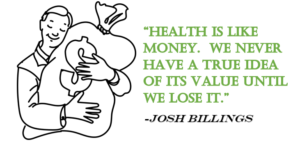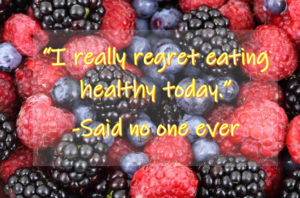 Have you ever heard someone say something similar to this:
Have you ever heard someone say something similar to this:
“No one lives forever…I might as well enjoy life while I can!”
or
“So what if I die a few years early? It’s worth it to be able to enjoy my donuts and fast food.”
We all have! But how many people regret this thinking later in life?
Here’s a quote that got our attention, and it might get yours as well…
“It’s not dying you should worry about…it’s chronic disease.”
The Legacy Project, which began in 2004, is a collection of practical advice from approximately 1,500 of America’s elders. People from across the country, in their 70s, 80s and beyond, were asked the question:
“What are the most important lessons you have learned over the course of your life?”
Their advice includes insight on marriage, money, career, everyday happiness, health, illness and how to grow old well.
According to the elders, this thinking of “everyone is going to die of something” is not just wrong…
it’s DEAD wrong!
 They know from experience that the penalty from a lifetime of bad health habits is NOT death, but likely years and years of suffering from chronic disease. Their advice: what you do TODAY for your health is critically important.
They know from experience that the penalty from a lifetime of bad health habits is NOT death, but likely years and years of suffering from chronic disease. Their advice: what you do TODAY for your health is critically important.
“It is not how long you will live, but how well you will live — your body may need to last you 100 years, so you should live that way.”
- Charlotte, 84 years old, says, “What you do when you’re young, it will hunt you up when you get old. If you’re young, take care of your body and live right and go to the doctor and keep yourself in good shape. Don’t abuse your body in any way, shape, or form. Now if you don’t do that, a lot of things come out later on in life.”
- Tina, 80 years old, talks about her beloved husband: “We were married 47 years. He promised me we’d have a 50th anniversary, and he lied to me. He left me at 47 and a half. He was sick for quite a while. He had a heart attack and prior to that he had carotid surgery, first one side then the other. He was a smoker. The kids saw how he had to suffer. And when you told him something about it, ‘Don’t smoke like that’ or his drinking, he’d say ‘So what? You’ve got to die sometime.’ But who suffers? The family.”
- Terry, 77 years old, says caring for your health when you’re young is his top lesson for living: “You need to have your health. If you have to be pushed around in a wheelchair with an oxygen tank, if there’s anything in life that you know right now that can prevent that, do it. Because as you get older, that’s when you really have an opportunity to sit back and enjoy life a lot more if you’re not in terrible health…whatever you can do to maintain your health…it will definitely make a difference later on in life.”
Quality of life?
 How many people just drop dead one day from smoking or being overweight?
How many people just drop dead one day from smoking or being overweight?
It typically doesn’t work that way, especially with advances in medical technology. The result is often years of additional life, but a lower quality of life. Many people with chronic disease may become dependent on medication, have increased pain and suffering, and experience a deterioration in their daily activities (simple joys like walking the dog, playing with kids or grandkids or even taking a shower).
Unfortunately, this can place new burdens on family members. Plus, these diseases can increase the cost of living for the patient and their family (higher co-pays and out-of-pocket costs), not to mention society as a whole!
Prevention is the key!
These chronic diseases – such as heart disease, stroke, diabetes, hypertension and cancer – are long-term diseases. They develop as a result of long-term decisions and the consequences are long-lasting. They account for 75% of all costs spent on healthcare in the U.S. And the real kicker is…many of these are preventable! Smoking-related chronic disease has decreased in recent years (possibly because of a variety of anti-smoking initiatives); however, diet-related disease continues to increase.
Scary thought…
A scary trend is how chronic disease is affecting people at younger ages…even kids! Have you noticed that it’s no longer called “adult-onset diabetes?” The “adult-onset” description has been dropped because of how prevalent this disease has become among children and teenagers.
It is Not too late to take action!
Evidence even shows that existing disease can be reversed! YES — it can be reversed!
Don’t we all deserve to continue to enjoy life as we get older?! Of course, we want to enjoy every moment with our kids today…and then when our kids are grown, we want to be around to spoil our grandkids too! Plus, have more free time to do more volunteer work, travel, and enjoy our hobbies.
We know simple behaviors can lead to much better health…it doesn’t have to be expensive…it doesn’t have to include a fancy diet…and it doesn’t have to be complicated. It’s really simple…EAT REAL FOOD!
Of course, physical activity is important too, but eating REAL food can be even MORE important than exercise. We have heard from SO MANY Eat REAL America members who have changed their eating habits and consistently say “it is so much easier than I thought it would be!”
Simple habits from those who live to be 100:
 (see our Blue Zone coaching tip for more info)
(see our Blue Zone coaching tip for more info)
- Enjoy breakfast like a king.
- Eat lots of vegetables, fruits, nuts and whole grains (in other words, REAL FOOD!).
- Eat mostly plants…especially BEANS!
- Enjoy meat and fish in small portions – 3 to 4 ounces – occasionally.
- Cook at home…where you control the ingredients.
- Enjoy meals with family and friends. (Not standing up and never eat with one hand on the steering wheel!)
- Eat until your stomach is 80% full. Emphasize quality over quantity — no mindless eating.
- Celebrate and enjoy quality REAL food!
Do you know someone who could benefit from this advice from our elders?
Let them know you are sharing it because you love them!
 LEARN MORE ABOUT THE NAPKIN!
LEARN MORE ABOUT THE NAPKIN!

Good advice – but I also know several people who live at the other end of the spectrum. Every food is inspected for calories, superfood worth, fat content, etc. I have cooked for these friends, and they won’t eat good home cooked foods – they bring their own bread, own salad dressing, own salad- and I am a good healthy cook! Grant it – these are probably people with eating disorders, but I just thought I would mention that I think health lives in the middle – with balance.
Ken always says if he’d known better when he was younger, he would’ve taken much better care of himself for sure. Better late than never though; his stats are much improved over the last two years that we’ve been Eating Real. He tells everyone your recipes are the reason we’ve been able to stick to our eating healthy plan–the food is SO GOOD. Tonight we had the Strawberry Basil Chicken and a spinach salad. Absolutely delicious! We’ve learned so much from your weekly articles as well. Thank you so much for leading the way to better health–we’re two of your biggest fans!
Thank you as always for being our motivation and inspiration – we are so grateful for you!
Truer words were never spoken! I’ve always been healthy and taken it for granted. Now I’m 67 and have just been diagnosed with kidney disease and high blood pressure. It’s hard to make the changes, but my goal now is to live long enough to see my 16 year old granddaughter graduate from college and achieve her dreams.